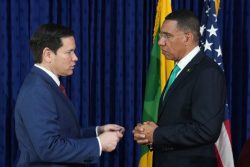MONTEVIDEO/BRUSSELS, (Reuters) – European Commission President Ursula von der Leyen landed in Uruguay yesterday seeking to finalize a long-delayed trade deal between the European Union and South Ameri-ca’s Mercosur bloc, even as France slammed the agreement as “unacceptable”.
Von der Leyen arrived hours after President Emmanuel Macron’s government collapsed following a no-confidence vote in parliament over efforts to rein in France’s budget deficit, leaving Macron scrambling to name a new prime minister.
The deal, 20 years in the making and deeply divisive in Europe where farmers and Paris have been the loudest voice in opposition, would create one of the world’s largest trade partnerships and turbocharge the flow of beef and grains.
“The finish line of the EU-Mercosur agreement is in sight. Let’s work, let’s cross it. The largest trade and investment partnership the world has ever seen. Both regions will benefit,” von der Leyen said in a post on X.
Mercosur, including farming powerhouses Brazil, Argentina, Uruguay and Paraguay, is meeting for a planned summit in Montevideo, with negotiators now expecting a trade deal to be unveiled, despite several false dawns, including a 2019-signed agreement that failed to get ratified by nations in Europe.
Four South American and European sources involved in the talks said the deal was done and would be announced on Friday by Mercosur leaders and von der Leyen now that both sides had ironed out final details on environmental issues and government purchases.
“Everything went as we expected. We worked out an agreement that was enough for both sides,” said one of the people, a South American source involved in the negotiations who asked not to be named as the deal was not yet public.
A government official from Spain, which has backed the deal, agreed: “The expectation is that it will be signed tomorrow.”
However, von der Leyen, just days into her second term, faces stern opposition at home to the deal, which would be the largest struck by the EU in terms of tariff reductions. EU countries as a whole and the European Parlia-ment would have to approve any trade deal agreed.
European farmers have repeatedly protested against it, saying it will lead to cheap imports of South American commodities, notably beef, which is not subject to the same green and food safety standards as in the EU.








